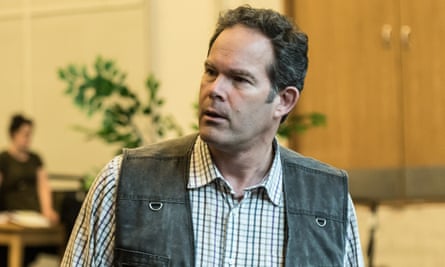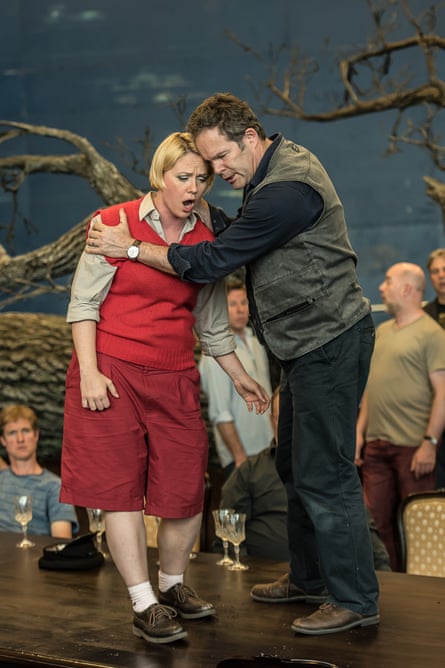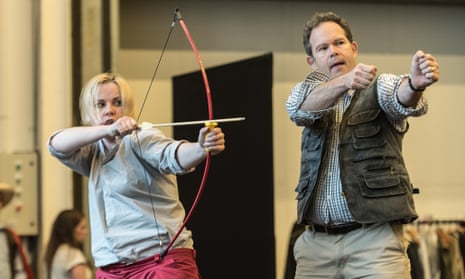As a young baritone, I first came across the famous aria by Rossini from his opera Guglielmo Tell (William Tell). Resta immobile was in the singer friendly Arias for Baritone album that was our student staple for auditions.
It’s the prayer he offers up before shooting the fateful arrow towards the head of his son, Jemmy. It’s a long enough aria to make an impression, but brief enough to be able to offer other arias if the panel liked you. I always felt the aria was a good example of what it felt to be nervous before a big moment. It is difficult, with a couple of good solid top Fs and, in the recordings I heard, some extrapolated top Gs from the stars of the day. (I resisted those notes in my early renditions!)
It wasn’t until years later, though, that I first encountered Rossini’s opera as a whole. And what a whole it is!. From the start of that famous overture (don’t miss Mary Schneider’s hilarious yodelling version), through to the multiple chorus pieces and extraordinary solo writing for tenor and soprano, with sections reminiscent of Bizet, Wagner and Verdi, it is constantly surprising and inventive. I was asked to sing the title role in a concert performance that was also to be recorded for CD.
William Tell, rarely done due to its length and use of immense musical forces, was going to be an adventure, and the task was to be made wonderful knowing that the conductor was Antonio Pappano with the Accademia di Santa Cecilia in Rome.
I usually try to leave scores at home during the summer vacation, and use the time to clear my mind and make it fresh for new music to arrive into the synapses. But, that year, with my schedule stuffed full of Don Giovannis, and unfortunate struggles with fitness, I realised that William Tell was to be my beach companion at least for part of the holiday.
Getting hold of a score was particularly challenging. There are many different versions, and there were whispers of new editions. The opera was originally written in French for Paris in 1829, and was later adapted for the Italian title of Guglielmo Tell for performances at the Teatro San Carlo in 1833. The French version is most generally performed today. I like the story that the Paris Opera archivist found the original orchestral score of the opera in a second-hand bookshop in 1898.
I managed to obtain a reasonably complete vocal score, and duly marked up the title part. I like to compare editions, just so that there are no nasty surprises – such as finding the score I’d ordered actually has a whole scene deleted!
The only other available score to compare was the Italian Ricordi version, which I understood was what was sung in Italy and at the Rossini festival in Pesaro. This was already a step into shaky territory. Besides being in Italian, with word underlay and rhythms completely different to the original French version, there were different scenes, whole sections of music missing or altered. I was reassured that a strategy about musical sections would be forthcoming. That, in opera-speak, meant “learn everything”.

I was now able to understand how that once-learned aria fitted into the whole opera. There seemed to be quite a few pages of chorus, and many pages of tenor singing, too. Little by little, I could see that Tell was involved in practically all the scenes except the Act One finale, and a couple of arias and duets between the tenor and soprano. He was intrinsically part of the build-up of rebellion and also of the musical progression. He may have only one aria, but his presence (and even lack of it onstage) is a critical part of unfolding events. A bit like Don Giovanni, he is spoken about in reverential tones by many of the characters, so he doesn’t ever need an aria to show off. This is a great character to play!
The 2010 concerts and recording of Guillaume Tell were exciting, dramatic and full of the passion that I have come to enjoy in every collaboration with Tony Pappano and his orchestra in Rome. His attention to the musical and dramatic detail in the score made every performer invest in the characters and live them through Rossini’s music.
Now, nearly five years later, I am – along with singers John Osborn and Malin Byström from that Rome performance – reunited with Tony Pappano in a new Covent Garden production. A new generation including Sofia Fomina, Enea Scala, Ji Hyun Kim and Samuel Dale Johnson join us, with Nicolas Courjal, Michael Colvin, Eric Halfvarson, Alexander Vinogradov and Enkelejda Shkosa as firm veterans. Our stage director is Damiano Michieletto, a young Venetian theatre-maker, who had success in versions of Verdi’s Falstaff and La Bohème at the Salzburg festivals of recent years.
There is always an edge when working with someone for the first time, particularly on stage. “Will they tell the story?”; “Are they musical?”; “Are they aware of the challenges that the singers face when trying to be physically responsive to direction (sing lying on your back/facedown/upstage/into the wings)?”; “Will the audience understand what we are doing?”. Happily, the answer seems to be yes, in every case.

Before the first rehearsal we got a production note. “Please be aware that the stage will be covered in soil. Please wear appropriate clothing”. Working on dirt for six weeks did not sound promising. But, from the minute we first entered the rehearsal room, astonishment at the ingenuity of the set-dressers was universal. Yes, dirt – but very clever dirt. Known as “crumb”, the realistic-looking foam material is not a singer’s best friend, with its sound-insulating properties, and it is a devil to keep it from leaving the rehearsal space. It has since been tracked all around the building, and even into my own bed, and not for lack of vigilance. It just gets everywhere, and I mean everywhere.
From there, the production became even more fascinating: projections, a story about the story, special effects (the arrow and all that stuff) as well as a modern psychological take on the characters and their references. Simple theatrical techniques create magic, dream sequences and characters imaginings. There are weapons, both modern and old-fashioned. Guillaume gets to work with a bow and arrow (lots of archery practice in the hours between rehearsals), handles a crossbow with dexterity, climbs trees, and gets into rather a bloody mess at one point. There is no hiding the fact that this is a war staging. And it can be bleak.
Rehearsals can be difficult. Singers, stage directors and music staff vie for the essence of a scene, but then that’s when they can also be at their most productive. And then there’s the issue of crowd control in this monumental opera, which features three men’s and two ladies’ choruses – almost 100 people.
Rossini might be surprised at the conflict in some of the relationships he would see in this production, but I think a modern audience will see interactions that are brutally familiar, however intolerable. The opera shows us the essential dilemmas and challenges faced by a community living under brutal foreign occupiers. As Tell struggles to keep his family together, he is asked to serve the greater good – a huge burden to take on, let alone fulfil. Rossini’s C major final scene will bring a conjoined sigh of resolve and a beginning of the end of the struggle. For some, that struggle may continue past the final curtain, as it would in life.
The life of this opera singer has come a long way from the “stand and sing” audition piece. It’s now about the repeated practice of firing arrows on to a target, shaking the bits off my boots, remembering to breathe deeply and enjoy that one, brief moment of prayer (a good thing to keep in one’s quiver) – and being part of four and a half hours of incredible music.

Comments (…)
Sign in or create your Guardian account to join the discussion